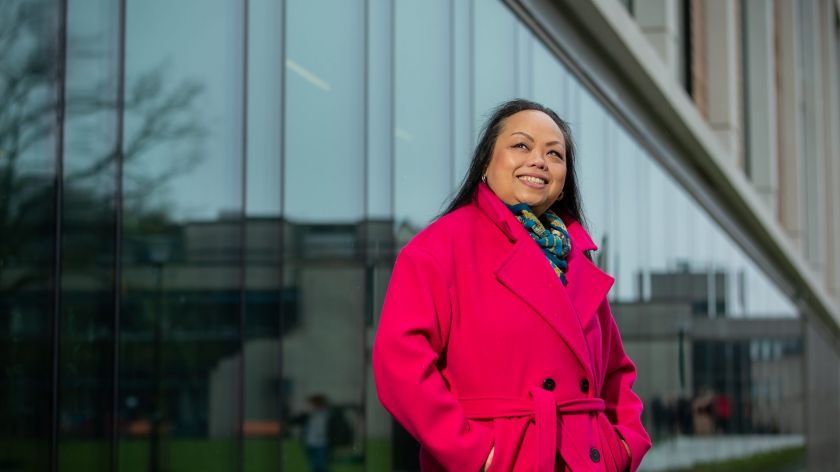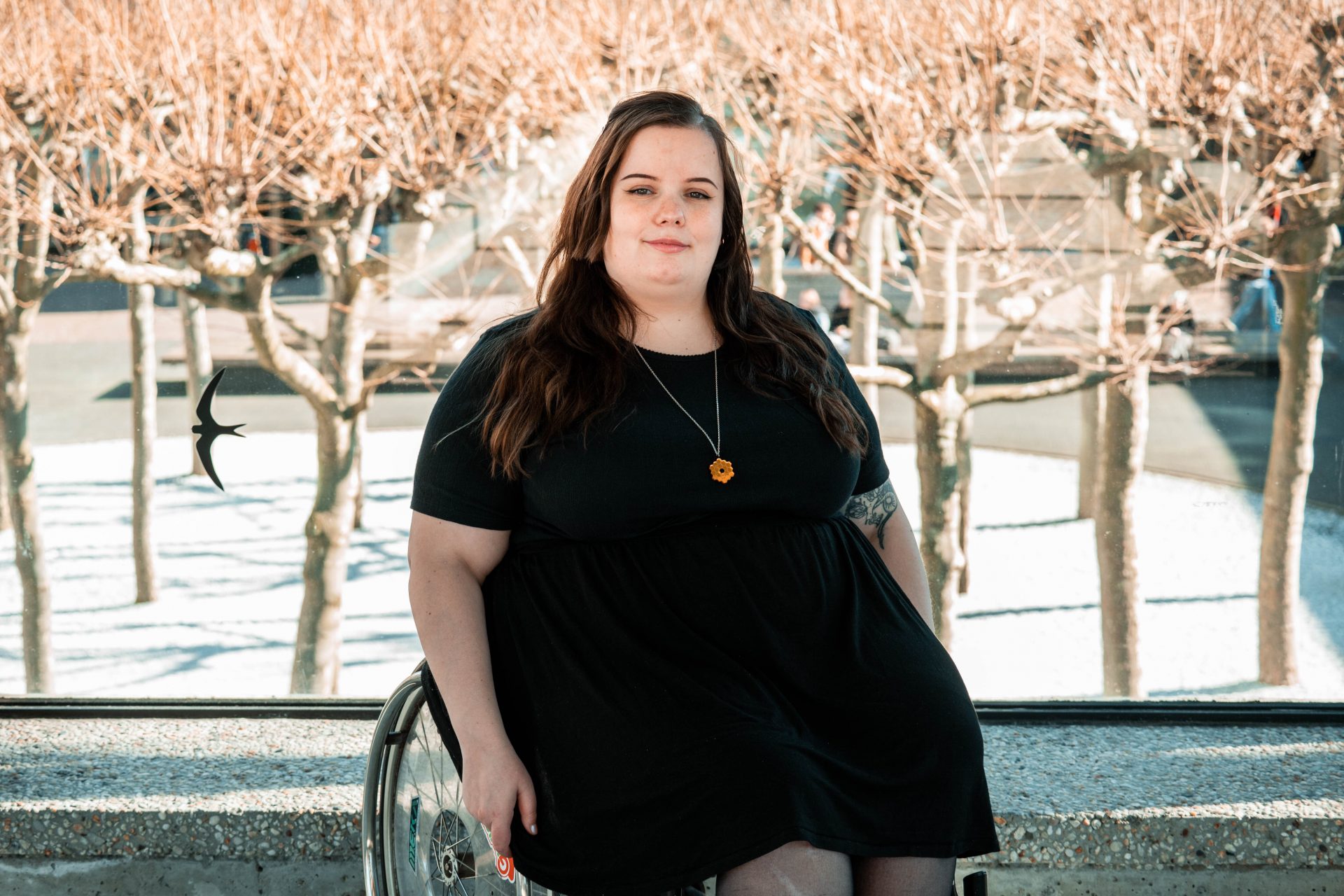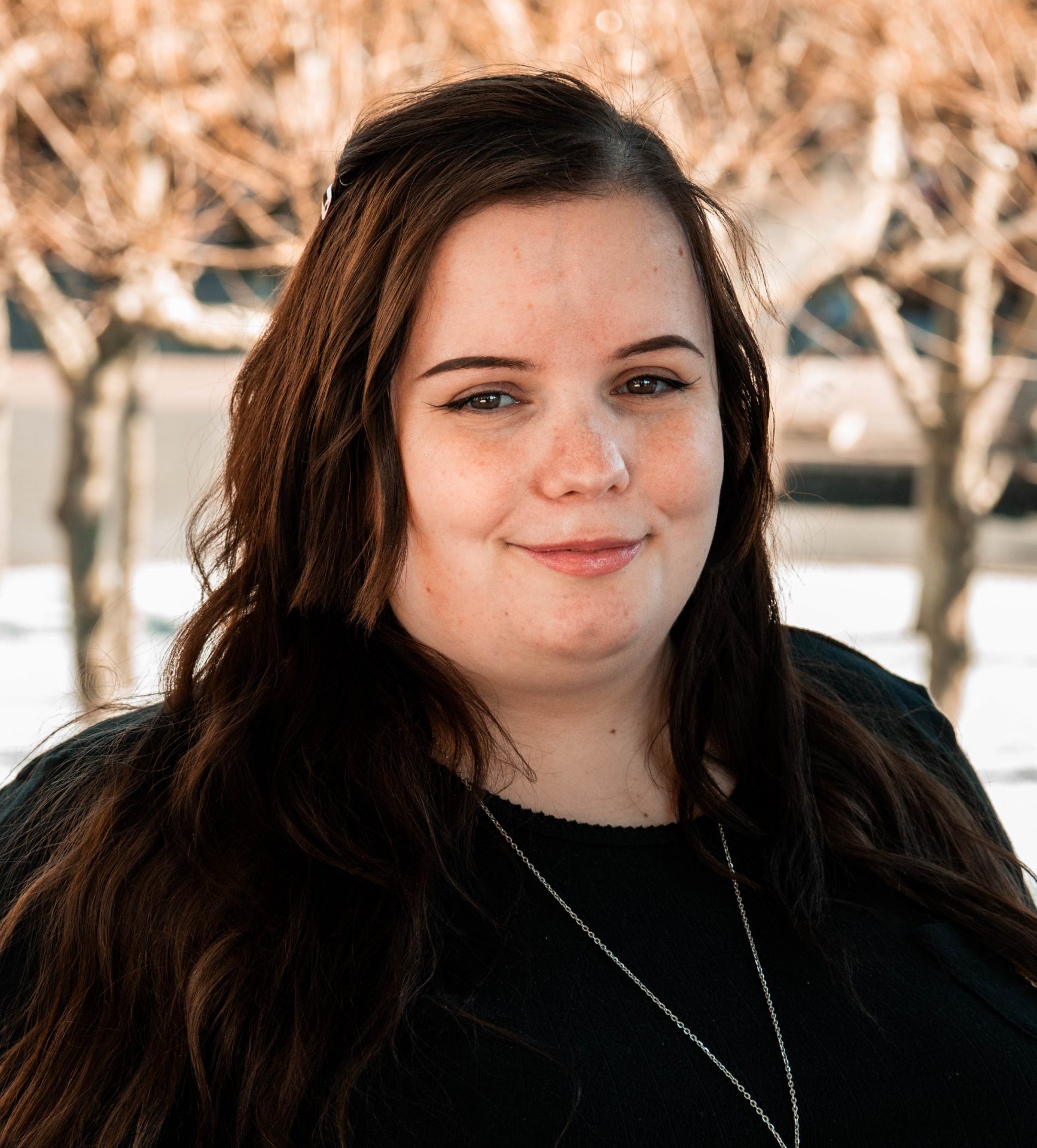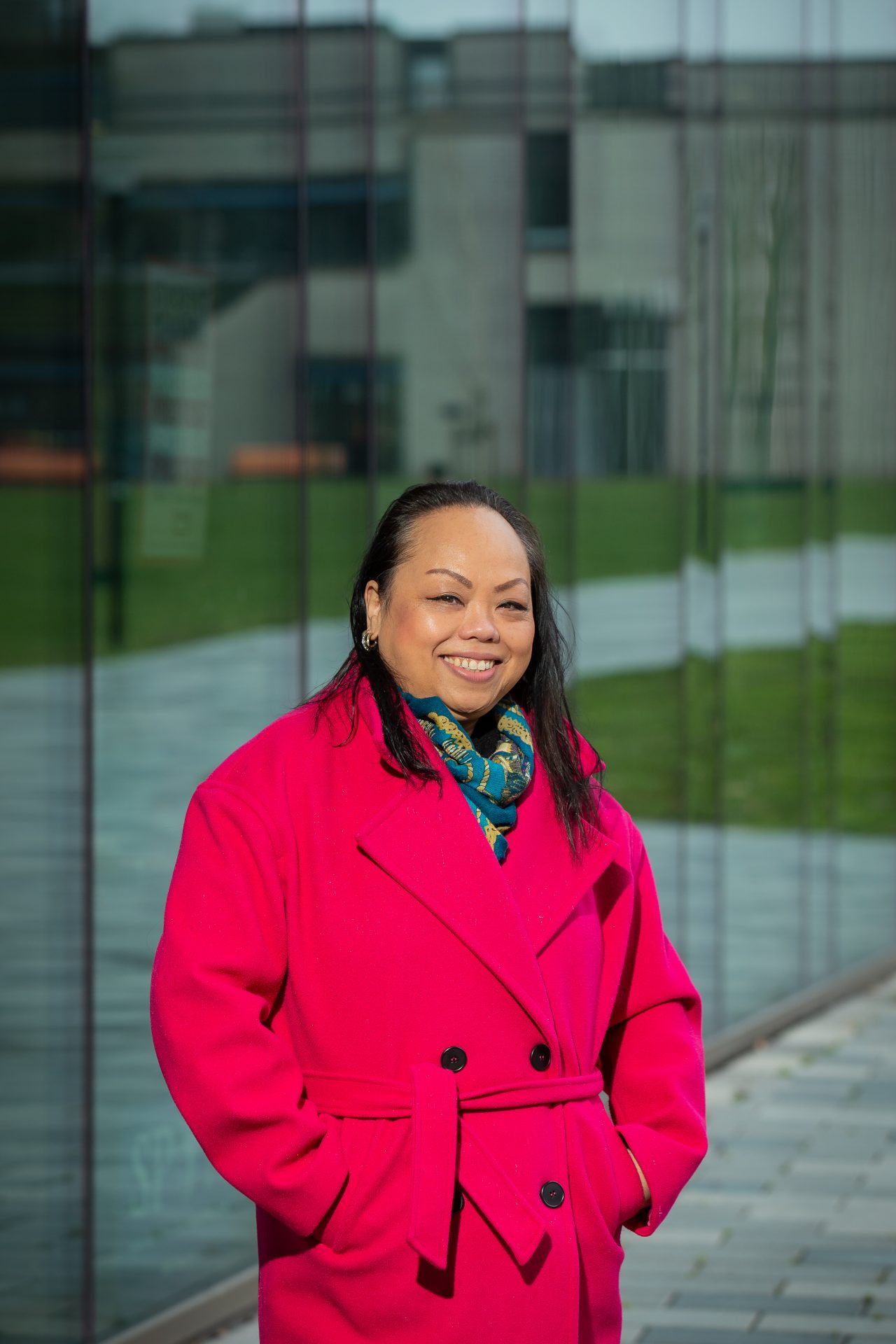University does not always consider the needs of people with a disability: ‘Suddenly, the lift stopped working’
-
 Priscilla Sopacua. Foto: David van Haren
Priscilla Sopacua. Foto: David van Haren
Accessibility on campus is not always sufficient for students and employees with a disability. Even the Maria Montessori building, the newest asset of the university, sometimes fails to provide an inclusive workspace. Vox asked a student and an employee about their experiences. ‘Flex-workspaces are inconvenient for people with a disability.’
In February of 2022, Romy Esselink is on her way to a lecture on the first floor of the Erasmus building, when suddenly, the lift button stopped working. As it turns out, a new university policy tries to promote taking the stairs and saving energy, and therefore the lift no longer stops on the first two floors. A bit further down the low-rise section of the building, there is a small lift that people in a wheelchair can use – which is a considerable detour. Esselink thinks aloud: ‘How did this happen? How can they take such a decision without taking the needs of people with mobility problems into consideration?’
Esselink suffers from osteogenesis imperfecta, a connective tissue disorder which causes brittle bones and hearing impairment. Because of this disorder, she relies on her wheelchair. The lift story is quite funny, she says. The second-year student of English Language and Culture goes on about the efforts she had to make to use the lift again, whilst having a smile on her face. After consulting the student advisor and the porter, eventually, the Service Centre gives her the contact information of the property owner. Despite all the efforts, it took 6 months before the lifts stopped on the first and second floors again.
Today, Esselink works as an advisor for the workgroup Accessibility for Everyone, in which real estate managers, employees, and students come together to discuss the physical access of the campus. However, she emphasises that many services and facilities are already adequately arranged.
Got a room right away
For example, when she had just started her studies in Nijmegen, the university got her a room right away in one of the SSH& student housing buildings. ‘There is a huge student housing crisis, but I instantly got appointed a room near the university, which was suitable for people with a disability. There even is a height-adjustable kitchen counter, something I have never seen anywhere else before. And there are also mobility aids in the bathroom, such as a chair and a support rail. That was awesome.’
Orientation week
For many students, the orientation week is a festive start to their student life. At the same time, this week is very wheelchair unfriendly, Esselink says. ‘There is no way you can join the activities. I have asked for possibilities, but they use the bike to get around town. And with six different activities on one day, it is impossible to keep up with public transport.’
Her student housing building is in stark contrast with some of the university buildings, such as the Linnaeus building. ‘That is the most wheelchair-unfriendly building of all time. When you enter the lecture halls, you need the stairs to get to the chairs. In some lecture halls, the only place to sit is at the spot of the technician, right in front of the beamer. As a result, you sit two meters above all other students, surrounded by the audio equipment.’
There are several drawbacks to sitting in the back of the lecture halls. Not only is it harder to hear the lecturer, but you also don’t get the opportunity to engage with your peers. You never get to sit together with your friends in the middle of the hall, because there are always stairs blocking the access.’
Built by the book
The newer buildings often have a better design, but even the newest university building is not completely accessible. ‘In the Maria Montessori building, I can use a small lift in the back of the building to enter the lecture hall. However, when entering the hall, I still need to get past a step to access the first row of chairs. This often results in me sitting in front of the first row of chairs by myself, without a table to sit behind.’ Again, Esselink takes the initiative to contact the student advisor, this time with the request to get a small table in the front of the lecture hall.
‘That’s the reason why I have joined the workgroup’, Esselink explains. ‘The Maria Montessori is built by the book, yet I don’t fit into the story. Even the designated table for students in a wheelchair which is placed at the top of the lecture hall, is unsuitable for me. My wheelchair is quite low to the ground and because of this, I mainly look at the backs of the last row of chairs. I can only see half of the screen.’
The main issue is that these situations are not exceptions, but rather the rule. That consumes a lot of energy. ‘Sometimes it feels as if they don’t want me to be there. For example, also in much smaller classrooms, I had to sit in the back of the room. You are not always in the mood to ask for a rearrangement of all the tables, just to get a better place to sit. I truly appreciate all the help, but sometimes I wish I could just participate without all the extra effort.’
Chaos
Nowadays, Esselink doesn’t sit at the back of classrooms anymore. ‘I didn’t have to ask for another seating plan anymore when I made more friends and got to know my teachers. Now if anything is blocking my way when I enter the classroom, chaos emerges and everyone helps to put everything aside.’
In the end, Esselink notices that everyone wants to be proactive and helpful. Teachers often try their best to help and the role of the student advisor is essential. She hopes that future students will not be discouraged by their disabilities. ‘I wholeheartedly recommend studying at Radboud University. Sometimes there are some hiccups, as is the case in the older buildings, but there are also many things going well. I have managed many times to relocate classes to more accessible classrooms. The university doesn’t think it’s an issue to do this for me.’
On top of that, she has a great time at the university. ‘I have met great people, who are just as interested in the courses as me. Tomorrow we have a day off to celebrate carnival. And of course, we get together to study at the library (she adds jokingly). I really love Nijmegen and the university.’
Small stairs
Priscilla Sopacua, a member of the support staff at Career Service Science and the Examination Board Secretariat, agrees that not all buildings on the campus are easily accessible. She has multiple non-visible disabilities, including polyneuropathy, a muscular disease that affects the nerves in the arms and legs. It causes, amongst other symptoms, pain and difficulties with walking and sitting.
Just like Esselink, she mentions the problems of the Maria Montessori building. ‘The other day, I had to get to the other wing of the building. In order to get there, you need to go to a higher floor, go down the stairs, cross a bridge, and go up the stairs, before reaching the other side of the building. It just so happened that day that walking was not as difficult, but there are many days that it is impossible for me to take that route. I can only think: if only they had just asked people with a disability whether the design of the building was convenient for them, the building could have been built completely differently.’
Sopacua, who also works as a secretary for the disABILITY and Accessibility Committee (see the box below), notices that the university is open for feedback. ‘We are in close contact with the people that think about the accessibility of new buildings, and one of the workgroups in our committee is fully dedicated to that topic.’
Flexible workspaces
Yet, university policy does not always consider the needs of people with a disability, Sopacua argues. Last year, the university announced in its Campus Plan that shared workspaces would become the norm across the entire campus. ‘Yet, flexibleworkspaces are inconvenient for people with a disability; they didn’t think about that. For instance, I have an adjusted desk, a special chair, an ergonomic keyboard, and a footrest. If I were to follow this policy, I would have to carry all these things to another office and reinstall this setup. I am unable to do so if my hands don’t work along.’
Another point of improvement, is the covid policy at the university. ‘Covid is now seen as a normal disease, yet there are many vulnerable people who are at a higher risk of getting the disease and people who have long covid.’ According to Sopacua, people do not always bear this in mind. ‘You always need to imagine another person’s perspective. Some people think that everything is possible again, because they are healthy and don’t fully understand the impact covid can have on someone with a vulnerable health condition.’
‘Flexible workspaces are inconvenient for people with a disability; they didn’t think about that’
Sopacua also suffers from asthma. Because of this condition, she tries to avoid crowded spaces on campus, and also the packed busses during rush hours. ‘When that happens, my workdays just last a little longer.’ However, she believes that public health should not be dependent on individuals. ‘There should be more protection for everybody. It is no longer advised to use covid self-tests, but how do you want to deal with this at the university? This makes it even harder for people with vulnerable health to do their work.’
Stigma
When Sopacua became ill, right in the middle of an exciting career in logistic planning, she couldn’t work for a long time. The Participation Act, which aims to get more people with occupational disabilities to find work, helped her get a job at Radboud University in 2019. She felt welcome from the start, she says. ‘I have great colleagues, who understand me and give me space. That means a lot to me.’
According to Sopacua, she was in luck, because people with disabilities are not always accepted. ‘There is quite a stigma attached to it, and that may cause employers to be hesitant in hiring people with a functional disability. People often think that it is hard to provide adequate guidance for people with a disability, they fear that you will engage in a long-term sickness leave or they have prejudices about a person’s mental health.’
Because of the stigma, Sopacua admits that she does not always openly speak about her disabilities. ‘I have had some challenges with my mental health too, but it is also not easy to tell people that you have a diagnosis. People instantly put you in a box because of it, and you don’t want them to.’ She thinks that the university can do something about this. ‘The university could raise more awareness among people without a functional disability, which can help increase empathy. That is also what the disABILITY and Accessibility Committee is working on.’
disABILITY and Accessibility Committee
The disABILITY and Accessibility Committee, which consists of employees and students, was founded last year and aims to improve the accessibility of the university. The committee’s goal is not confined to improving the campus’ physical access, but also focused on increasing the accessibility of the campus for students and employees with autism or an anxiety disorder.
Translated by Sophie Verhoeven






